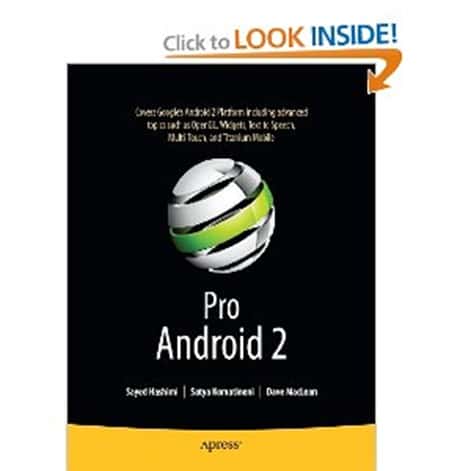I recently completed reading Pro Android 2. It is a pretty large book, so it took me awhile, but I finally got through it. I hadn't really read any other Android books, so I don't know how it compares.
The book goes through creating an Android application using Eclipse. It contains many source code examples that are very complete. The book really seems to be focused more on getting going vs going in-depth with the APIs.
The good:
- Great jump start diving right into Android development without wasting much time.
- Very complete examples that can get you going and can be modified for your own application.
- Balances basic examples with more complex architectural constructs well. There is a good mix of examples that build on basic concepts and show how to implement more of an MVP style of development.
- Covers a pretty wide breadth of the Android platform, which makes it easy to know what exactly is capable.
The bad:
- Although the beginning of the book was very interesting and informative, some of the chapters seemed to drag on.
- A whole huge chapter devoted to search. Search is not something that most applications would need to make use of.
- A whole huge chapter on 3d application development. Not something I felt should have been in the book. Pretty boring and actually really scary. I don’t think I’ll ever develop a 3d application for Android.
What I learned:
I had already started building my Android application before reading this book, so not very much of it was completely new to me, but I definitely learned some things from the book.
I was really surprised to see how easy 2D animation is with Android. The book does a good job of explaining it and providing examples. I feel like I could very easily implement 2D animation after reading this book.
I learned about how to create and use content providers. This aspect of Android development is a bit tricky, but I felt like Pro Android 2 did a good job of explaining it and providing examples that I would be able to use.
I also learned to create a home screen widget. The examples in the book were really good and provided a complete usable implementation that could be easily used as a base for creating your own.
Towards the end of the book, Titanium Mobile is mentioned. Titanium Mobile is a WebKit-based native application development framework which allows developers to write applications that target multiple platforms. It looks really cool, and I kind of wish that was the first chapter in the book so that I could have explored that before getting so far into actual Android development.
Overall, I would definitely recommend the book. I feel pretty confident that someone with no Android experience should be able to pick up that book and get going with their first application. I definitely learned some things the hard way before I read the book.

